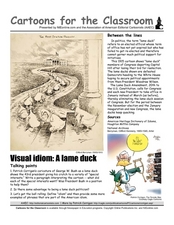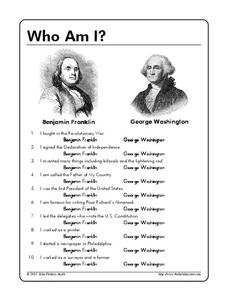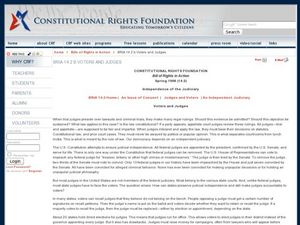Curated OER
Cartoons for The Classroom: Lame Duck Congress
Clear up "lame duck" congressional confusion with this political cartoon analysis worksheet. Background information on the concept's history and current use is provided, and 2 cartoons give a past and present context. Three talking...
Library of Congress
The Emancipation Proclamation and the Thirteenth Amendment
How did the Emancipation Proclamation lead to the Thirteenth Amendment? Middle schoolers analyze primary source documents including the text of the Emancipation Proclamation, political cartoons, photographs, and prints to understand the...
Teaching Tolerance
Changing Demographics: What Can We Do to Promote Respect?
America has always been seen as a melting pot to the world. Scholars research the concept of blending cultures in the United States and how it is changing over time. The final lesson of a four-part series analyzes the changing...
Curated OER
Internet Fact Hunt at the "Fact Monster" Web Site- Hunt #33
In this Internet fact hunt worksheet, students access the "Fact Monster" web site to locate the answers to 5 multiple choice questions. They answer questions about US history, geography, literature, and science.
Curated OER
A House Dividing: The Growing Crisis of Sectionalism in Antebellum America
Students explore the debates over American slavery and the power of the American federal government for the first half of the 19th century and how the regional economies and political events produced a widening split between the states.
Curated OER
George Washington Crossing the Delaware: A Study of Setting and Character
Students examine "Washington Crossing the Delaware." For this American Revolution lesson, students analyze the painting, research its background, and then perform skits based on their findings.
Curated OER
Songs the Express American Ideals
First graders will learn the words to two American ideals songs: "My Country 'Tis of Thee" and "America the Beautiful." They will also learn the Pledge of Allegiance and what it means to recite it. This is a great resource for your...
Curated OER
A Look at the History of Book Banning in America
Why do books end up on the banned book list? How do these banned books contribute to the literary canon? Start by showing the photo slide show, and discussing notably banned books. Then focus on some of the most popular objections:...
Curated OER
By Heart
To memorize, or not to memorize: that is the question. Whether 'tis nobler to suffer the fear and anguish of committing a poem to memory, to endure the heartache, to shuffle off this fear, and face the stares of classmates with the hue...
PBS
The History of Book Banning in America
Harry Potter, Are You There God? It's Me, Margaret, To Kill a Mockingbird. Kids view a slide show and then discuss the seven banned books featured in the presentation and the reasons why the books may have been banned.
Constitutional Rights Foundation
Options for Affecting Public Policy
Letter-writing, e-mail and telephone campaigns, petitions, marches, meetings, with lawmakers. Options for influencing elected representatives are the focus of resource that details how to craft each of these approaches to influencing...
Museum of Tolerance
Documents That Shape Society
The Bill of Rights is a foundational document of American democracy, much like the Nuremberg Laws were a foundational document of the Reichstag of Nazi Germany. But that's where their similarities end. Engage high schoolers in a...
Curated OER
Four Enlightenment Thinkers
Students examine lives, philosophies, and political beliefs of four Enlightenment Thinkers: Baron de Montesquieu, Jean-Jacques Rousseau, Thomas Hobbes, and John Locke. Students then work with partner to write short speech from...
Curated OER
Wartime and the Bill of Rights: The Korematsu Case
Twelfth graders work together in groups to examine the discrimation Japanese Americans felt after the bombing of Pearl Harbor. Using primary source documents, they analyze and discuss the case of Fred Korematsu who was placed in an...
Curated OER
The Eiserloh Story
Students read "The Eiserloh Story" and evaluate decisions made by the government in time of war. They determine if the government violated the rights of innocent civilians. They identify the Bill of Rights and analyze each Right.
Curated OER
Civil Rights and the ADA
Middle schoolers examine and discuss the 14th and 15th amentments, and evaluate the agendas of Americans from underrepresented groups in the quest for civil rights. They conduct Internet research and create essays or posters regarding...
Curated OER
Freedom of Expression in Special Places
Young scholars analyze the judicial decision making process, and identify three places presenting First Amendment problems. They analyze how the 1st Amendment applies to school newspapers, and argue for and against limiting 1st Amendment...
Curated OER
Who Am I?
In this Benjamin Franklin and George Washington worksheet, students examine 10 statements and decide whether the each of the statements identify Benjamin Franklin or George Washington.
Curated OER
The Federalist Papers
What were The Federalist Papers? If you're preparing your class for a quiz on this topic, consider providing them with these thought-provoking study questions. Ten questions are provided, although only three contain possible answers.
Curated OER
The Executive Branch
Students study the federal government, which is divided into 3 branches. They have a minimal understanding of the responsibilities of each branch.
Curated OER
Voters and Judges
Students analyze the work on independent judiciaries. In this federal courts lesson, students listen to their instructor lecture on details of federal cases. Students respond to discussion questions and participate in an activity...
Curated OER
Mueller v. Allen
Students investigate a First Amendment legal case involving religion, education, and reimbursement of tuition payments. They research the background of the cases and its precedents.
Curated OER
Should Homosexuals Have the Right to Laws Protecting Them From Discrimination?
Students explore discrimination issues in America. In this homosexual rights lesson, students listen to their instructor lecture on antidiscrimination laws and gay rights. Students respond to questions about the Romer v. Evans case.
Curated OER
English Vocabulary Skills: AWL Sublist 5 - Exercise 2b
In this online interactive English vocabulary skills worksheet, students answer 10 matching questions which require them to fill in the blanks in 10 sentences. Students may submit their answers to be scored.

























